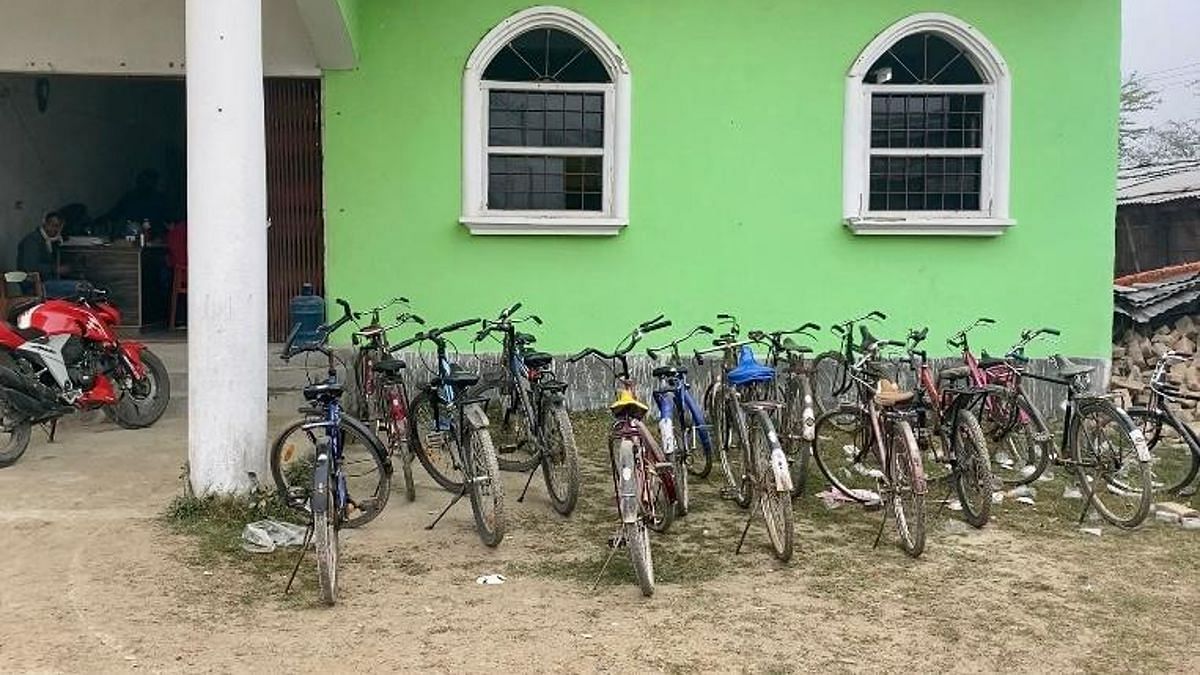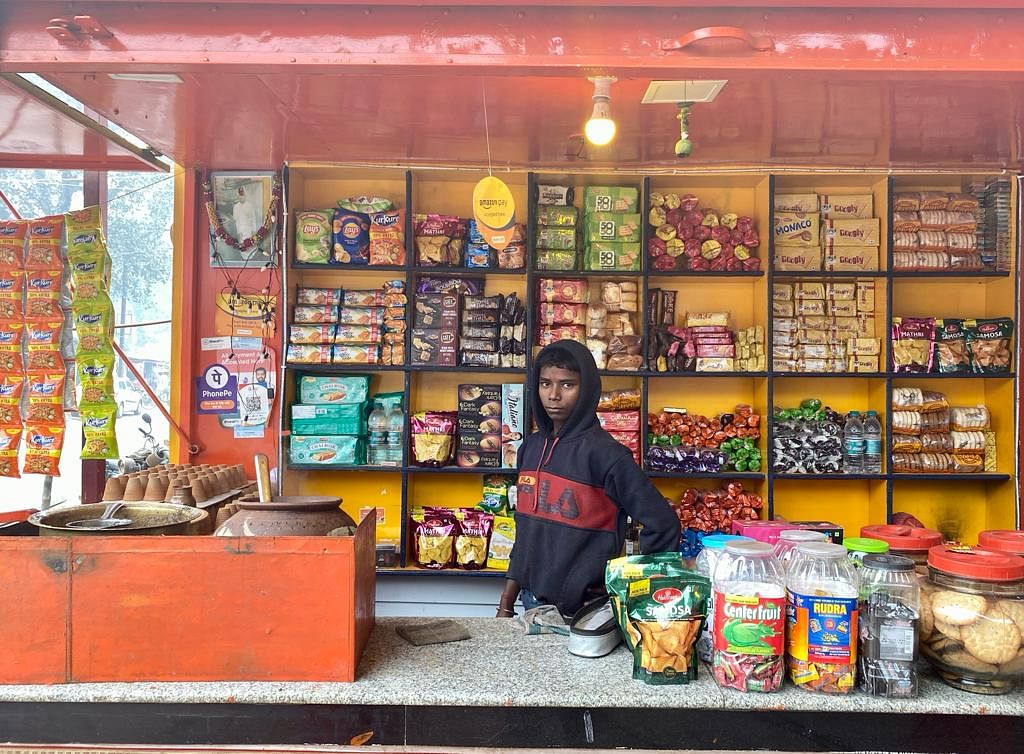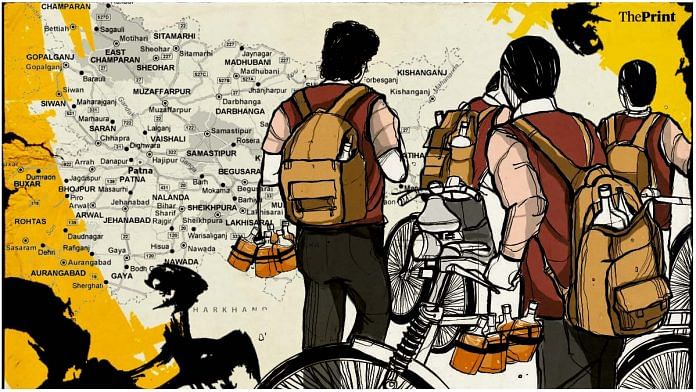Vaishali/Muzaffarpur/Samastipur: What do you do if you’re a teenager in prohibition-imposed Bihar and schools are closed, or you’re unemployed? The friendly neighbourhood bootlegger has a solution — be a rider taking liquor to the customers’ doorstep at Rs 100 per delivery.
The liquor trade has been flourishing in the state despite a ban since April 2016. Procuring alcohol is a punishable offence, yet reports suggest that the law is little impediment to the trade.
Several people ThePrint spoke to in Bihar’s Muzaffarpur and Samastipur districts, as also in Hajipur, Vaishali, said the trend of teenage boys, from lower-and-middle-income families, delivering liquor has grown in these areas and all over Bihar in the last two years — since the Covid pandemic started.
Jwala Kumar, a tuition teacher at a small coaching centre in a Muzaffarpur village, said in the last two years, he has seen at least five of his students drop out of school to become delivery boys for liquor.
Asked about the issue, Muzaffarpur Senior Superintendent of Police (SSP) Jayant Kant told ThePrint: “Some teenagers are involved in these activities along with some other persons as well. The police are cracking down on the business.”
Samastipur SP Hriday Kant said he did not have any hard data on the basis of which he could comment on the issue. “But in case there is involvement of school boys, we have asked teachers and other members of the community to keep an eye out and inform us,” he said.
The SSP of Vaishali, Maneesh (who only goes by his first name), pointed out that persons of all ages are involved in illegal activities but refused to comment specifically on school dropouts being involved in liquor delivery.
While no data is available with the Bihar government on the number of school dropouts in the wake of Covid, data from the Union Ministry of Education for 2019-20 reveals that dropout rates in Bihar are the highest in India at the upper primary level (Class 6 to 8).

The data shows that 8.9 per cent of students in Bihar dropped out of school at this level. At the Class 9 to 10 level, 21.4 per cent of students dropped out of school in the state.
ThePrint reached Bihar Education Minister Vijay Choudhary by phone and text for a comment on the matter, but there was no response by the time of publishing this report.
Some teens look for quick money, others have problems
According to local residents, despite the prohibition, alcohol is widely available in Bihar, from cities to small towns and villages, at three to four times the price. So, if a bottle costs Rs 400, it will be sold illegally for Rs 1,200 and everyone involved gets a certain cut. The delivery person gets Rs 100 per delivery.
A businessman in Hajipur said the delivery boys are all school students.
“If you want alcohol, I will give you a number, make a call, and you will get delivery on the spot in the next 20 minutes. A young boy will come and deliver it to you… they are all school boys, who are sitting at home because schools are closed,” said Rishi Raj, the businessman.
ThePrint managed to find three school dropouts of whom one is currently working as a liquor delivery person and the others dabbled in it earlier. Two of them did not want to be named for fear of being caught by the police.
The one who currently delivers liquor is a 16-year-old boy who dropped out of school in Class 8 in 2020 and is a resident of Faridpur in Muzaffarpur district. He told ThePrint that he took up the job after his friends told him it was easy money and the police would never catch them.
Sometimes he rides his bicycle to reach the place of delivery and if the place is nearby, he simply walks.
“I have three brothers, all younger than me, and my father drives an auto. I know that my father will not be able to give me a good education in future, so I don’t see a point in studying. I earn enough money doing what I do,” he said.
The second boy, from Hajipur, used to deliver alcohol till about two months ago but has quit now.
Sitting on his bike, wearing a red sweater and beige trousers, the 17-year-old looked calm as he talked about his past. He said he’s talking to the media because he wants other boys to quit.
“Getting into illegal trade is like going in the deep end. Once you deliver illegal liquor, people will expect you to do more… like snatching, robbery and bigger crimes. I quit this before I could be involved in all that,” he told ThePrint.
He added that his reason for entering the illegal business was just to make some quick money for spending with his friends and not because of financial problems. His father has a provision store in Hajipur and the family is financially comfortable.
What this youngster said has precedent. There have been several examples through history of bootlegging becoming the stepping stone into organised crime for people, spurred on by the lush revenue.
For example, Maharashtra, in the 1950s, saw small-time criminals taking to organised crime, after the state banned manufacture, purchase, transport and consumption of alcohol from 1949 to 1963. Many youth at that time took up bootlegging and this in turn is believed to have given rise to the underworld in Mumbai.
Profits from the illegal trade supplied money for gambling, the gun racket and terrorism. The biggest of the bootlegging operations was run by Vardarajan Mudaliar — one of the first underworld dons of Bombay.
American gangster Al Capone used to be one of the most feared bootleggers. He attained notoriety during the prohibition era in Chicago as the co-founder and boss of the Chicago Outfit. Dean O’Banion, another American gangster based in Chicago, was also a bootlegger. He was also into violence, theft and extortion.
Also read: ‘Feel like tearing my books, going home’ — the deep despair behind Bihar’s railway jobs protest
Why students drop out
Amit Kumar, former block development officer in Patna, who now teaches at Patliputra University but has worked with government schools in the past, said “enrolment at the primary level in Bihar’s government schools is good because parents want their children to eat midday meals, get free uniforms and other benefits”.
“But as the children grow older, parents want them to start helping with the household income, hence the dropout rate at upper primary level is very high,” he added.
“During the pandemic, schools have mostly been shut, hence there are no midday meals and free uniforms. So, those who were sending their kids to schools have stopped doing that. Dropouts have happened at all levels,” he added.
Teacher Jwala Kumar, who tutors students from classes 6 to 12 at an institute in Mustafaganj village in Muzaffarpur, told ThePrint: “Several of my students have dropped out of school in the last two years because schools have been shut due to Covid. They do not even come to the coaching classes anymore. They work as delivery boys who deliver alcohol for as less as Rs 100 per delivery.”
“They manage to earn somewhere between Rs 500 and Rs 1,000 daily in this business and they think they need not study anymore since they are making enough money this way,” he added.

Rajesh Kumar, another teacher in Samastipur, also reported that two of his students dropped out of both coaching classes and school to earn money through illegal means. “When these young boys see the level of unemployment in Bihar and the fact that even graduates and postgraduates in the state are earning as less as Rs 3,000 per month, they think there is no need for them to study further as they can earn more just by delivering liquor,” he told ThePrint.
An earlier version of the report incorrectly identified the Bihar Education Minister as Vinay Chaudhary. His name is Vijay Choudhary, and it has been corrected in the report. The error is regretted.
(Edited by Nida Fatima Siddiqui)
Also read: ‘Change name to prohibition’ — Bihar teachers tell education department for liquor lookout letter



